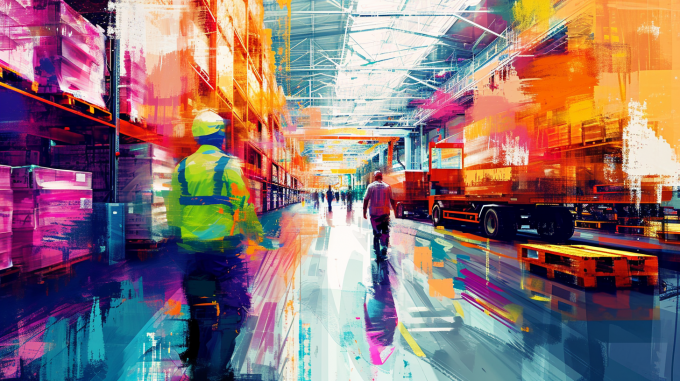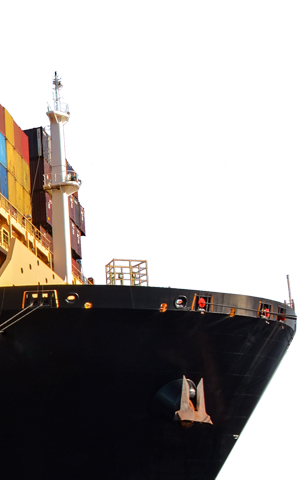Transforming retail logistics with the power of AI and machine learning
- Home
- >
- Cargo Blog
- >
- Transforming retail logistics with the power of AI and machine learning

Worried about stockouts during peak season? Frustrated by unpredictable shipment delays eating into your budget?
AI and machine learning are redefining retail logistics, solving these issues and empowering you to optimize your supply chain. By introducing these advanced elements, it becomes possible to predict demand, foresee problems before they happen, and automate essential logistics, ensuring that every supplier and every store has what they need, when they need it. So, it should come as no surprise that AI and machine learning offer great potential for transforming the industry.
The transformative potential of AI in retail logistics
AI applications today surpass yesterday’s goals of optimizing route delivery or performing basic analysis. The true power of AI technologies in retail logistics is the accurate handling of massive data regarding inventory, supply, analytics and order fulfillment, and using that data to predict the future. Through pattern recognition and increasingly intelligent automated processes, AI offers the benefits of boosted efficiency, accuracy and cost-effectiveness throughout your logistics operations.
Benefits of AI to logistics operations
Efficiency
AI can process orders and data in large quantities with perfect accuracy. Once AI learns the standards for information and data handling, the system can efficiently process operations and even learn from edge cases and error handling.
Accuracy
AI can cross-check logistics operations data for accuracy with greater attention and diligence.
Cost-Effectiveness
AI can reduce costly mistakes and the time needed to accomplish complex retail logistics operations.
Machine learning’s role in revolutionizing the retail supply chain
Machine learning algorithms can improve demand forecasting by studying past order histories and identifying the signals for upcoming trends. This can help retail stores and manufacturers avoid shortages or excessive surplus by predicting customer demand levels. Machine learning algorithms learn from past data, assisting in planning, inventory management and delivery optimization.
For example, AI can follow seasonal trends, weather reports and delivery times to predict the right time to start stocking up on winter gear, so it’s available just before the first cold front hits your customer’s region. It can also identify surges in demand paired with inventory resupply patterns to prevent shortages.
Case studies and success stories in retail logistics
Several leading retailers have already integrated AI machine learning into their logistics operations.
One example is H&M, a popular clothing brand, which analyzes purchase receipts at each local store to keep in-demand products restocked.
3PM uses AI to detect counterfeit products and online listings.
The Lowes robot has gotten a lot of press for helping customers find what they’re looking for, but the robot also scans the shelves and uses AI to send restock orders.
How AI can apply to your retail operations
Here’s a list of other AI-powered solutions helping retail logistics and supply chains today:
| Company | AI Platform | Description |
|---|---|---|
| AutoScheduler.AI | Optimizes resources to improve warehouse operations | |
| Gather AI | Uses drones to monitor inventory and improve accuracy | |
| KlearNow.AI | Customs Engine | Enables companies to move goods efficiently and compliantly through customs and ports |
| LevaData | Helps companies source parts faster at a competitive price and make data-based decisions about their direct materials sourcing | |
| Loadsmart | ShipperGuide CoPilot | Powers forecasting engines and allows companies to generate reports, maps, and charts based on their shipping data |
| Maersk | Captain Peter | Enables companies to track cargo from container loading to store door delivery with its AI-enabled reefer visibility assistant, Captain Peter |
| Microsoft | Supply Chain Platform CoPilot | Predicts supply chain disruptions and addresses risks in supply chain |
| nuVizz | RoboDispatch | Helps logistics service providers optimize assets for the movement of shippers materials or components from suppliers or vendors to their facilities |
| Overhaul | RiskGPT | RiskGPT allows users to quickly respond to in-transit shipment risk |
| Project44 | MovementGPT | Responds to shipper queries based upon its dataset |
| ProvisionAI | LevelLoad | Analyzes shipment patterns and identifies spikes in demand over the next 30 days to help companies plan loads and create a more balanced transportation plan |
| Roambee | Provides supply chain visibility by combining real-time IoT sensor information with data from the supply chain to provide insights and forecasts | |
| Symbotic | Offers robotic case pick capabilities that can help distributors serve retail customers. | |
| ToolsGroup | SO99+ | Provides an AI-powered probabilistic forecasting engine to gain insights into demand behavior and optimize inventory turns |
| Verusen | Improves the match rate for materials requested by manufacturers and other companies, enabling suppliers to respond promptly through its natural-language interface |
Big brands and national stores aren’t the only retailers that can benefit from AI and machine learning. AI-powered business software and tools have become widely available for retail operations big and small. Consider how you can apply these technologies to your operations.
One way to find out more about real-world AI in retail logistics is to attend the Retail Industry Leaders Association (RILA) LINK Supply Chain Conference in Dallas, Texas, from Feb. 25 – 28, 2024. Industry experts will discuss how retailers are turning tomorrow’s tech into today’s results at a panel called, Embracing Innovation.
While you’re at the LINK conference, you’re invited to check out the JAXPORT booth #814 on the exhibit floor, where you can learn more about how our port is enhancing efficiency for global retailers.
The integration of AI and machine learning into retail logistics is not just a trend, but a transformational shift propelling the industry forward. Don’t miss the opportunity to be at the forefront of this exciting evolution. Join us at the LINK Supply Chain Conference to see how JAXPORT is leading the way in logistics in the U.S. Southeast.
